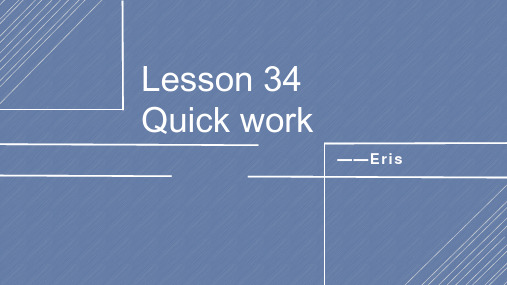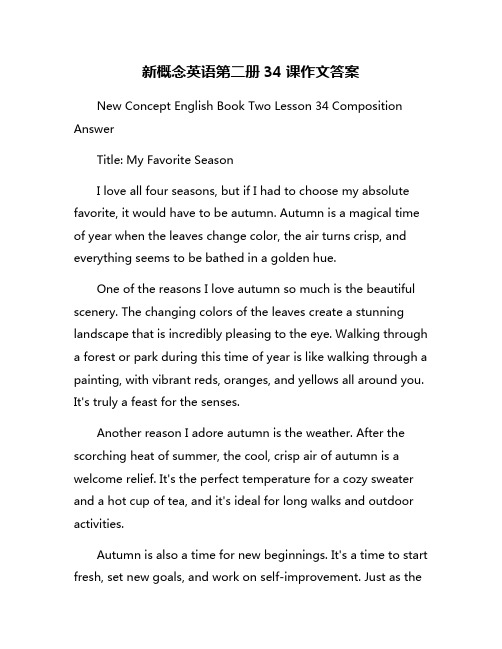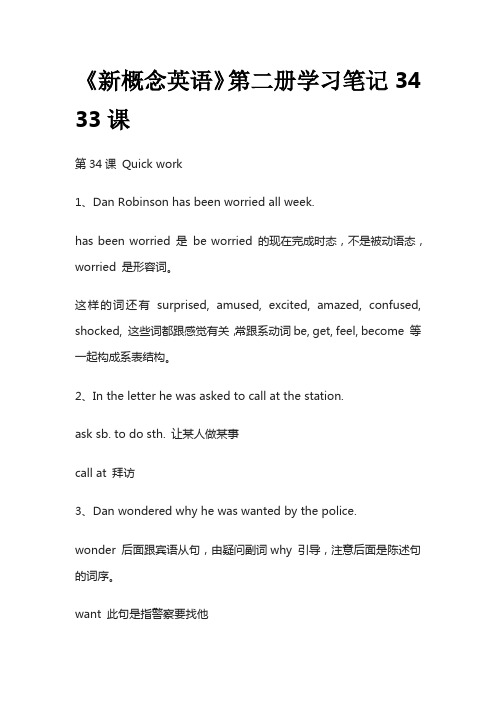新概念英语第二册第34课
新概念英语第二册34课作文答案

新概念英语第二册34课作文答案篇1New Concept English Book 2 Lesson 34作文答案1. Write a passage about your hometown.My HometownI come from a small town called Greenfield. It is situated in the countryside, surrounded by lush green fields and rolling hills. The town has a population of around 5,000 people, making it a close-knit community where everyone knows each other.One of the things that I love about my hometown is its peaceful atmosphere. The streets are quiet and clean, and there is hardly any traffic. The air is fresh and crisp, and you can often see the clear blue sky stretching out above you. It is a perfect place to relax and unwind after a long day.Greenfield also has a rich history, with many old buildings and landmarks scattered throughout the town. The town hall, built in the 18th century, is a beautiful example of Georgian architecture. There is also a quaint old church that dates back tothe medieval period. Walking through the town, you can sense the history and tradition that surrounds you.In terms of amenities, Greenfield has everything you need. There are several small shops and cafes where you can buy essentials or grab a bite to eat. There is also a small library and a community center where you can take part in various activities and events.Overall, I feel incredibly lucky to have grown up in such a beautiful and peaceful town. Greenfield will always hold a special place in my heart, and I hope to return to visit it often in the future.2. Write a passage about your favorite holiday destination.My Favorite Holiday DestinationOne of my favorite holiday destinations is a small beach town called Seaside Cove. Located on the coast, Seaside Cove boasts stunning views of the ocean and golden sandy beaches that stretch for miles. It is a paradise for beach lovers and nature enthusiasts alike.The town itself is charming, with colorful beach huts lining the promenade and quaint cafes and shops selling souvenirs and local delicacies. The atmosphere is laid-back and relaxed, makingit the perfect place to unwind and escape the hustle and bustle of everyday life.One of the highlights of Seaside Cove is its beautiful beach. The sand is soft and golden, and the water is crystal clear and inviting. You can spend hours sunbathing, swimming, or building sandcastles with your loved ones. In the evenings, you can take a leisurely stroll along the beach and watch the sun setting over the horizon, casting a golden glow over the ocean.For those who prefer a more active holiday, Seaside Cove offers a range of activities such as surfing, kayaking, and hiking along the stunning coastal cliffs. You can also take a boat trip to explore the nearby islands and spot dolphins and seals in their natural habitat.Overall, Seaside Cove is a hidden gem that offers the perfect combination of natural beauty, tranquility, and adventure. It is a place that I will always hold close to my heart, and I cannot wait to return and create more wonderful memories in the future.篇2New Concept English Book Second Book Lesson 34: Writing AnswerRecently I read a book called "The Call of the Wild" by Jack London and I found it extremely captivating. The story follows a dog named Buck who is stolen from his comfortable home in California and taken to the Yukon territory during the gold rush. Throughout the novel, Buck faces numerous challenges and learns to survive in the harsh wilderness.One aspect of the book that I found particularly interesting was the way that London portrays the relationship between humans and animals. Buck is subjected to both kindness and cruelty from his various owners, which highlights the complexity of the human-animal bond. London also explores the idea of the "call of the wild," which refers to the primal instincts that lie dormant within all creatures.Another theme that resonated with me was the concept of survival of the fittest. Buck must learn to adapt to his new environment and fend for himself in order to survive. This theme is a central aspect of the novel and serves as a powerful reminder of the harsh realities of the natural world.Overall, "The Call of the Wild" is a thought-provoking and stirring novel that explores themes of survival, loyalty, and the bonds that connect all living creatures. I highly recommend thisbook to anyone looking for a gripping and emotionally resonant read.In conclusion, "The Call of the Wild" is a timeless classic that continues to resonate with readers of all ages. London's vivid descriptions and compelling characters make this novel amust-read for anyone interested in the human-animal bond and the power of the natural world.篇3New Concept English 2 Lesson 34 Composition AnswerIn this lesson, we have learned about how to express possession in English using 's or of. In English, there are different ways to show possession depending on the situation.For example, we use 's to show possession when we are talking about people or animals. For example, "John's book" means that the book belongs to John. We can also use 's with a possessive pronoun, such as "my sister's car" or "their teacher's office".When we are talking about things or group of people, we usually use of to show possession. For example, "the car of my friend" or "the capital of France".In addition, we can use an apostrophe without an s to show possession when we are talking about plural nouns ending in s. For example, "the students' books".Overall, understanding how to express possession in English is important for effective communication. It helps to clarify who or what owns something and adds more information to a sentence.In conclusion, learning how to express possession using 's or of in English can help us to communicate more clearly and effectively. By practicing and using these rules in our writing and speaking, we can improve our language skills and become more proficient in English.。
(完整版)新概念英语第二册课件(Lesson-34-Quick-work)

★ most [ məust ] ad. 最;相当,非常 e.g. the most important discoveries a most interesting movie
worry ['wʌri] ['wɜ:ri] adj.表示“焦虑的”、“担心的” e.g.: She’s worry. vt. 表示“使担心/发愁” e.g.: Nothing worries me vi.表示“忧虑,担心” e.g.: She appears to be worried about
wonder= want to know wonder whether/if/who/when/where/what/why
+ 从句”
她想知道那个孩子在干吗。 She wondered what the child was doing. 我想知道他来不来。 I wonder whether/if he will come.
一只睡着的狗 a sleeping dog
一张焦虑的脸 a worried face
• Five days ago, the policeman told him, the bicycle was picked up in a small village four hundred miles away.
accept &receive? 他已经接受了我们的邀请。
He has accepted our invitation. 我没有收到你的传真。
I didn’t receive your fax. accept: 强调主动地或自愿地接受,或者说,经过考虑后同意
接受。
receive: 着重仅仅接到或收到这一结论或事实,而不含采取主 动或积极行动的意思。
新概念第二册 Lesson 34课件

课文分析
【2】Last Tuesday he received a letter from the local police.
★local adj. 当地的,本地的
local news 当地新闻 local color 地方特色 local people 当地人
native ['neɪtɪv] n. 土著人 adj. 土生土长的
【练一练】 这是这个家庭最有趣的照片。 This is the most interesting photo of the family.
单词讲解
many和much的最高级 many--more--most much--more--most most绝大多数的(前面不加冠词)
例:大多数的男孩喜欢足球。 Most of the boys like football. 【练一练】:他们中的大多数都迟到了。 Most of them were late.
She wondered who that man was/ what had happened. 她想知道那个人是谁/到底发生了什么事。
She wondered what the child was doing. 她想知道那个孩子在干吗。
I wonder whether/if he will come. 我想知道他来不来。
For some reason, they called off the party.
【练一练】开始下雨了所以我们取消了比赛。
It began to rain so we called off the match.
【练一练】
1. I called _o_n__ you five times yesterday. Were you out?
新概念英语第二册34课PPT课件

3. In the letter he was asked to call at the station.
call at: (对某地)拜访 He calls at every house in the street once a month.
call on :探望(某人);号召 你最近去看过乔治吗? Have you called on George recently? 校长号召学生们更努力地学习。 The headmaster called on the students to work harder.
call out :大声叫喊 Some people on the bank called out to the man in
the boat.
call sb. up: 打电话给某人 她将在明天给你打电话。 She'll call you up tomorrow.
call off: 取消 天开始下雨,所以我们取消了比赛。 It began to rain so we called off the match.
9. He was amused too, because he never expected the bicycle to be found.
amuse vt. 娱乐;消遣;使发笑;使愉快
大家听了关于那只狗的故事都笑起来了。
Everyone was amused at/by the story about the dog.
1. Dan Robinson has been worried all week. be worried about=worry about worry & worry about
Tony is worried about his students. Tony worries about his students. Tony worries his students.
新概念英语第二册34课作文答案

新概念英语第二册34课作文答案New Concept English Book Two Lesson 34 Composition AnswerTitle: My Favorite SeasonI love all four seasons, but if I had to choose my absolute favorite, it would have to be autumn. Autumn is a magical time of year when the leaves change color, the air turns crisp, and everything seems to be bathed in a golden hue.One of the reasons I love autumn so much is the beautiful scenery. The changing colors of the leaves create a stunning landscape that is incredibly pleasing to the eye. Walking through a forest or park during this time of year is like walking through a painting, with vibrant reds, oranges, and yellows all around you. It's truly a feast for the senses.Another reason I adore autumn is the weather. After the scorching heat of summer, the cool, crisp air of autumn is a welcome relief. It's the perfect temperature for a cozy sweater and a hot cup of tea, and it's ideal for long walks and outdoor activities.Autumn is also a time for new beginnings. It's a time to start fresh, set new goals, and work on self-improvement. Just as theleaves fall from the trees and make way for new growth in the spring, autumn is a time for shedding old habits and embracing change.In conclusion, autumn is my favorite season for its stunning scenery, perfect weather, and opportunities for growth and renewal. I look forward to it every year and cherish the time I get to spend enjoying all it has to offer.。
《新概念英语》第二册学习笔记34 33课

《新概念英语》第二册学习笔记34 33课第34课Quick work1、Dan Robinson has been worried all week.has been worried 是be worried 的现在完成时态,不是被动语态,worried 是形容词。
这样的词还有surprised, amused, excited, amazed, confused, shocked, 这些词都跟感觉有关,常跟系动词be, get, feel, become 等一起构成系表结构。
2、In the letter he was asked to call at the station.ask sb. to do sth. 让某人做某事call at 拜访3、Dan wondered why he was wanted by the police.wonder 后面跟宾语从句,由疑问副词why 引导,注意后面是陈述句的词序。
want 此句是指警察要找他These two men are wanted by the police. 此句中want 指被警察通缉。
4、Now he is not worried anymore.not ......anymore 不再此句可以换一个说法Now he is no longer worried.no longer 不再5、The bicycle was picked up in a small village four hundred miles away.away 此句中是副词,表示多少距离以外pick up 此句中是指意外找到6、被动语态是动词的一种形式,表示主语是动作的承受者。
注意被动语态的动词要根据时态的变化而变化。
第33课Out of the darkness1、One afternoon she set out from the coast in a small boat and was caught in a storm.one afternoon 时间状语,前面不加任何介词set out 出发,固定搭配be caught in 突然赶上,陷入2、She swam to the shore after spending the whole night in the water.water 指sea water3、Early next morning, she saw a light ahead.early nest morning 第二天凌晨,第二天一大早4、On arriving at the shore, the girl struggled up the cliff towards the light she had seen.on arriving at the shore 介词on 后面跟一个动名词短语,表示一个时间概念,用来做时间状语,意思相当于as soon as, 后面连接时间状语从句5、That was all she remembered.all 后面是定语从句she remembered, 前面省略了引导定语从句的关系代词that6、When she woke up a day later, she found herself in hospital.find oneself + 其它成分,感觉或者意识到自己处于某个特定位置,或者某种情形,这种感觉和意思并不是由主观意愿决定的。
新概念英语第二册第34课习题答案详解

新概念英语第二册第34课习题答案详解1. d根据课文第3行Dan wondered why he was wanted by the police… 能够判断d. he didn’t know why the police wanted him 是感到焦虑的真正原因,所以应该选d. 其他3个选择都是课文提及的情况,但不是他焦虑的真正原因。
2. a根据课文第8-9行Dan was most surprised… he never expected the bicycle to be found 能够判断,只有a. had probably forgotten all about his bicycle(可能把他的自行车早忘得一干二净了)符合当时的心情,是准确答案。
其他3个选择都不符合他当时的心理感受。
3. b(c)yet (d)anymore 都不符语法,因为它们常用于否定句中,而本句是肯定句. (a)even 不符合题意,应该同比较级连用才准确;(b)still 能够用在肯定句中表示仍然,还,所以只能选(b)still4. ca. had been finding 和 d. have been finding 都不是准确的时态,动词find(找到)强调结果,不应该用实行时态;b. had been found语态不对,因为本句的主语是人,是动作的执行者,故不能用被动语态;c. had found最合乎时态和语态,所以只能选c5. a本句是对地点提问的疑问句,回答是In a small village,只有a. Where 是问地点的,所以a. 是准确答案,而其他3个选择都不是问地点的。
6. da. to 和b. to be 都不合乎语法,因为以that引导的是从句,应该有主语和谓语,而不应该是用to引导的动词不定式, c. they也不合乎语法,因为主句动词是过去式,从句也应该是过去时态. d. they would 是过去将来时,最合乎语法,所以只能选它.7. c本句有表示过去时间的状语twenty years ago(20年前),所以应该用一般过去时。
新概念英语第二册第34课课文

新概念英语第二册第34课课文
摘要:
一、课文概述
1.文章主题:描述一个关于一位年轻女子Joanna的日常生活和兴趣爱好
2.文章结构:分为三个段落,分别介绍Joanna的早晨、下午和晚上活动
二、详细内容
1.早晨部分
a.Joanna起床时间及早晨习惯
b.早餐内容
c.前往工作地点的交通方式
2.下午部分
a.工作内容
b.下午茶的享用
c.下班后的购物活动
3.晚上部分
a.与朋友共进晚餐
b.晚间娱乐活动:看电影、跳舞
c.回家后的阅读习惯
正文:
新概念英语第二册第34课课文以一位名叫Joanna的年轻女子为主人公,生动地描绘了她的日常生活和兴趣爱好。
在早晨,Joanna会在7:30起床,然后进行简单的晨练,如做一些伸展运动。
接着,她会为自己准备一顿丰盛的早餐,包括牛奶、麦片、水果和面包。
之后,她乘坐公共汽车前往工作地点。
在下午,Joanna会开始她忙碌的工作,这包括处理文件、接听电话以及与同事讨论项目。
下午茶时间,她会品尝美味的蛋糕和红茶,以此放松自己。
下班后,Joanna喜欢去商场购物,为自己添置一些衣物和日用品。
晚上,Joanna有时会与朋友共进晚餐,谈论彼此的近况。
之后,她们可能会去看一场电影,或者去舞厅跳舞。
尽情娱乐之后,Joanna会在晚上10:30左右回到家中,在睡前进行一段阅读,以此结束她充实的一天。
这篇课文通过描述Joanna的日常生活,向我们展示了她健康、充实的生活方式。
- 1、下载文档前请自行甄别文档内容的完整性,平台不提供额外的编辑、内容补充、找答案等附加服务。
- 2、"仅部分预览"的文档,不可在线预览部分如存在完整性等问题,可反馈申请退款(可完整预览的文档不适用该条件!)。
- 3、如文档侵犯您的权益,请联系客服反馈,我们会尽快为您处理(人工客服工作时间:9:00-18:30)。
Quick Work
Nice to meet you!
•Did you do anything special yesterday? •Have you ever been to a police station? • Have you been on the scene of a crime?
3. “use your head”: 学会,学成功 • Where did you pick up your French? • He picked up mending cars when he was working in a car factory. 4. 使好转,改进,增进…… • Sue was able to pick up her health under the help of the doctor. • The train is slowly picking up speed.
a) 拿起,拾起: 电话铃一响,我就拿起了话筒。 I picked up the receiver as soon as the phone rang. b) 用车接人: 我来办公室接你。 I’ll pick you up at your office. c) (不经意) 学到: 她是在巴黎学会法语的。 She picked up French in Paris. d)(无意地,顺便地)获得,找到: 你在哪儿买到那本书的? Where did you pick up that book?
• In the letter he was asked to call at the station.
Call at: (对某地)拜访 He calls at every house in the street once a month. call on :探望(某人);号召 你最近去看过乔治吗? Have you called on George recently? 老板号召员工们更努力地工作。 The boss called on the employees to work harder. call out :大声叫喊
Dan wondered why he was wanted by the police, but he went to the station yesterday and now he is not worried anymore.
wonder= want to know wonder whether/if/who/when/where/what/why + 从句” 她想知道那个孩子在干吗。 She wondered what the child was doing. 我想知道他来不来。 I wonder whether/if he will come.
Hey, Jack! You’re wanted on the phone. This is the man who is wanted by the police. Want 用于被动语态时可以表示想与某人见面,谈话,或表 示通缉,追捕。 Not…any more: 我不能再见你了。 I can’t see you any more. 我不能再等了。 I can’t wait any more. 他不再是个年轻人了。 He is not a young man any more. Not…any more=no more Not …any longer=no longer
1. call at to visit 2. call on He was asked to call at the police station. George is calling on me tonight. (Less formal)
3. call out: shout 4. call up: telephone People on the bank called out to the man, but he didn’t hear them. Mr. Green will call you up tomorrow morning. 5. call off: cancel It began to rain so we called off the match. The couple decided to call off their reservation.
------Call------
wonder 想知道
I wonder why.
I was wondering if …
I was wondering if you can have dinner with me. -What are you doing? -I’m just wondering.
Translation
• It is now being sent to his home by train.
长江上正在修建另一座大桥。 Another bridge is being built over the Changjiang River. 我们公司正在举行运动会。 The sports meeting is being held in our company. 现在员工正在打扫车间。 The workshop is being cleaned now.
大家听了关于那支狗的故事都笑起来了。 Everyone was amused at/by the story about the dog. 有趣的故事 Amusing stories Except sb. to do sth.
pick sth. up „„
1. use your hand: 拿起 • The bicycle was picked up in a small village 400 miles away. 2. use your car: 搭便车 • I’ll drive to work tomorrow so I can pick you up at your house.
• At the station, he was told by a smiling policeman that his bicycle had been found.
一只睡着的狗 a sleeping dog 一张焦虑的脸 a worried face
Байду номын сангаас
• Five days ago, the policeman told him, the bicycle was picked up in a small village four hundred miles away.
• Dan was most surprised when he heard the news.
Most前面不加冠词,表示“非常”、“极其” 你心肠真好。 That’s most kind of you . 他对我真是彬彬有礼。 He was most polite to me.
• He was amused too, because he never expected the bicycle to be found.
1. 我想去拜访一下当地的居民。(call on) 2. 老板不能来,请取消会议。(call off) 3. 我想问一下我可以抽烟吗?(was wondering…) 4. 我再也不吃猪肉了。(not…any more) 5. 他肯定想不到我们给他的这个惊喜。 (expect)
Last Tuesday he received a letter from the local police.
accept &receive? 他已经接受了我们的邀请。 He has accepted our invitation. 我没有收到你的传真。 I didn’t receive your fax. accept: 强调主动地或自愿地接受,或者说,经过考虑后同意 接受。 receive: 着重仅仅接到或收到这一结论或事实,而不含采取主 动或积极行动的意思。 a local newspaper local shops:临近的商店 I’m local.
